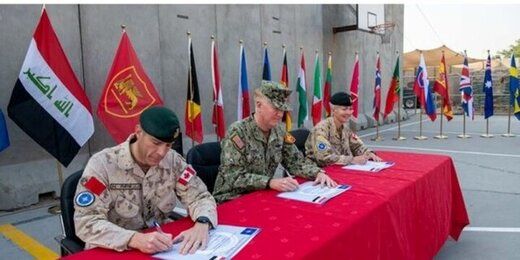Seyyed Razi Emadi told the Strategic Council on Foreign Relations that the issue of the exit of American forces from Iraq has now turned into a serious demand of the people in that country.
He added that NATO’s decision to increase by eight times its forces in Iraq under the present circumstances aim to give legitimacy to the presence of American forces and make it legal.
NATO is seeking to re-station and legitimize the presence of American forces in Iraq
He said American troops constitute a large portion of NATO military forces in Iraq.
“It seems that increasing the number of NATO forces by eight times is a move against the parliament enactment on the eviction of American forces from Iraq. This means it is possible that after the enforcement of this law, the issue of the exit of American forces of NATO is pursued but they are re-stationed in the form of NATO forces in Iraq. This is in fact a re-stationing of American military forces and legitimizing their presence in Iraq. Therefore, it is against the Iraqi parliament approval which clearly considers the presence of American forces illegal and illegitimate.”
This analyst of West Asia affairs said the Western front is making a lot of efforts to weaken the Hashd al-Shabi in Iraq. Such efforts have been taken in various forms. However, when we look at the status of Iraq, we can see that Hashd al-Shabi has not weakened in that country. In the 2018 elections, the list which was supported by Hashd al-Shabi gained the second highest number of seats after Saaroon. Moreover, Hashd al-Shabi is playing a strong role in the political process and introduction of cabinet and prime minister and has been admitted as an official military force under the auspices of the Iraqi Defense Ministry.
Weakening of Hashd al-Shabi is one of the main objectives of the presence of NATO forces in Iraq
Emadi added that Hashd al-Shabi is the main military group in Iraq which is opposed to the interference of foreigners in the internal affairs of the country, saying that the military force is also against the normalization of relations with Israel. Therefore, he said, one of the main goals of boosting NATO forces in Iraq is to weaken Hashd al-Shabi.
He emphasized that other reasons could be behind this decision at the regional level. However, it seems that those regional reasons such as besieging or controlling Iran under the present conditions have been weakened and now more focus is paid to the issue of the presence and foreign influence in this region.
What they are seeking here is to strengthen the presence and influence of the United States or NATO in the region, he said.
Emadi added that NATO was primarily established as a military alliance against the influence of the former Soviet Union but with the collapse of the former USSR, the NATO has lost its function.
“This presence in Iraq and other countries similar to Iraq aims to maintain the primary reason of its establishment and prevent its breakdown. In the light of foreign military presence, NATO can justify its existence.”
Referring to the negative impacts of US forces in Afghanistan from the viewpoint of security and stability, he added that various Iraqi parties and government officials have not yet reacted to the eight-fold increase in the number of NATO forces in Iraq.
“If we wanted to see the realities, it should be mentioned that unfortunately, there is no consensus in Iraq in this regard. Some Iraqi groups are opposed to the presence of NATO forces in their country. Such groups mainly include Hashd al-Shabi and Shia groups. They are against the NATO presence and an increase in their number in Iraq. However, there are other groups that are not opposed to the military presence of NATO and foreign forces including the United States of America.”
More opposition to the presence of NATO military forces
This analyst of West Asia affairs said “therefore in this respect, it cannot be said that there is a specific consensus among Iraqi groups. We see a division in this respect in Iraq. Some groups are opposed and consider it as a violation of the sovereignty of Iraq and react to it. Some others are defending their position. However, in general, it seems that groups opposed to such a presence play a stronger role. The presence of NATO forces would step up opposition not only to American forces but to NATO troops as well.”
There is no determination to delegate security affairs to Iraqi forces
Emadi said Iraqi forces are capable and able to provide their own security without the intervention of foreign forces, adding that “I believe that if there is lack of determination by foreign players to make Iraq non-secure, Iraqi forces are able to provide security in the fight against terrorism. These foreign players are not necessarily terrorist groups but countries such as the United States are trying to make Iraq insecure.”
He explained that if there is no serious will to make Iraq insecure, the terrorism today is not like the terrorism of 2014 as it has weakened.
“In Iraq, terrorism has been partly exterminated. Notwithstanding, there are remnants that can conduct suicide bombings and explosion. However, in general, Iraqi military forces are able to supply their own security if foreign players dot not obstruct.”
Emadi said that “even though it seems that regrettably there is no serious determination by global powers to delegate security to independent Iraqi forces, efforts and resistance of Iraqi forces would be influential on such determination.”










0 Comments